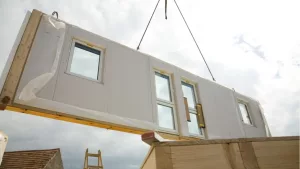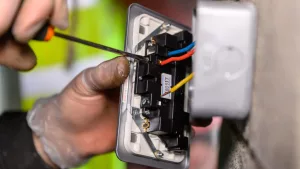Pros and Cons of Modular Homes (2025)
Go Back To Previous PageModular homes are often more cost-effective, and their construction process usually takes less time compared to traditional homes. The assembly line method of building can result in savings on both labor and materials. However, it’s important to note that some areas may have restrictions on where modular homes can be placed or may require special permits. Therefore, research local zoning laws and regulations before purchasing a modular home.
When discussing home design and building options, the growing popularity cannot be overlooked. They are frequently highlighted in real estate magazines, and many people are beginning to request them by name. They’re trendy and can be surprisingly elegant.
While modular homes can be an excellent investment for the right person, they may not be suitable for everyone. If you are considering one for your future residence, it’s crucial to weigh both the advantages and disadvantages of this popular trend.
What Is a Modular Home?
A modular home is a type of dwelling that is constructed in a factory setting. These homes are mass-produced and can either be built as a complete unit or as a customizable “mix and match” option. When you order one, you receive all the necessary supplies along with a guide to assist in assembly.
Historically, they were viewed as a cost-effective way to quickly build a house, and they carried a stigma associated with low quality. However, that perception has changed over time. Today, modular homes are much more luxurious and are designed to meet a variety of aesthetic and functional standards.
Pros
In recent years, modular homes have experienced a surge in popularity. This phenomenon is not merely a passing trend; it is rooted in genuine reasons. Modular homes are becoming increasingly appealing in today’s economy. Here are the key selling points that explain why so many people are interested in them.
1. Cheap Cost
They are typically 15 to 20 percent cheaper than stick-built homes.
There’s no need to ask, “Are modular homes cheaper than stick-built homes?” The answer is clearly yes. Because modular homes are designed for easy assembly, the labor costs are lower.
Additionally, they come with pre-cut materials, eliminating the need for an architect, and everything is delivered directly to the site. This efficiency reduces costs further by allowing the construction process to be completed more quickly.
2. Quality Control
Modular homes are built to a high standard and are no longer the low-quality prefabricated homes of the past. Each model undergoes rigorous quality control, ensuring that you receive a well-constructed product and not just a façade of quality. This is why there are often fewer zoning issues when they are transported.
Additionally, they can appreciate in value over time, which is why you rarely hear complaints about their resale value.
3. Speedy Setup
Modular homes can be assembled in just a few days or weeks, making them a much faster option compared to traditional homes, which usually take seven months or longer to construct. These homes are specifically designed for quick setup, including the entire building process. If you need to build a home quickly, it’s worth considering modular homes.
4. Energy Efficiency
Modular homes are significantly more energy-efficient than traditional homes. Enthusiasts of eco-friendly design will be pleased to know that most modular homes available on the market today come equipped with energy-efficient windows, siding, and insulation. This results in a home that requires less energy to operate.
Cons
Modular houses may not suit everyone. While the risks associated are not life-threatening, they can lead to disappointment. Here’s what you need to know about the major downsides.
1. Financing Difficulties
While modular homes can be a great investment, lenders often face challenges when it comes to financing them. Since modular homes are not considered traditional buildings, securing enough funding involves additional steps.
One of the main issues with modular homes is that buyers frequently struggle to obtain funding in a timely manner to pay contractors. This is an important factor to consider if you are interested in purchasing a modular home. Fortunately, there are more financing options available than just traditional banks.
Many modular home manufacturers offer their own financing and lending programs. Therefore, if you’re having difficulty finding a lender, exploring these options could be a beneficial route to take.
2. Finding Land
This issue has two main aspects. First, you need to find a suitable piece of land that is both large enough and of high quality to build a traditional-style home. This can be challenging, especially if you wish to live near an urban area.
Additionally, many regions have land use restrictions that dictate the types of structures permitted. In some jurisdictions, modular homes are banned, making it difficult to find a community that aligns with your preferences.
Moreover, you’ll need to consider the cost of purchasing the land for your home, which can significantly impact your budget.
3. Mixed Perception
Despite the unfairness to houses currently on the market, the stigma surrounding modular homes remains strong in many circles. In the past, modular homes were often confused with mobile homes, which negatively impacted their perceived quality.
While modular housing has gained popularity recently, lingering biases from earlier days still affect its reputation. Many realtors and older homebuyers remain hesitant to consider modular homes because of outdated perceptions.
The positive news is that this reputation is quickly changing. Even traditional buyers now recognize that a high-quality models can sell for a great price in the resale market today.
4. A Lack of Customization
When most people consider building a home, they often envision a space that reflects their personal tastes and preferences. They imagine a unique design filled with the amenities they desire, styled exactly to their liking.
However, one issue with modular homes is that they aren’t fully customizable. This limitation means you may have to accept compromises regarding certain features or tolerate a floor plan that doesn’t perfectly align with your vision.
The lack of customization can be a dealbreaker for many prospective homeowners, particularly if creating their dream home is a significant life goal. Ultimately, it’s up to you to determine whether this limitation is a major obstacle or something you can overlook.
5. Smaller Sizes
Modular homes are often slightly smaller than typical “stick-built” homes; however, this is not a strict rule. If you decide to choose a modular home, you can expect to find many compact houses that feature a sleek and modern design.
That said, larger modular homes are available for sale, but you are unlikely to find modular-made mansions.
Pros & Cons Bottom Line
If you’re in the market for a high-quality home that combines style with affordability, modular homes might be the perfect option for you. They offer excellent value for your money. However, like any home investment, choosing the right modular home can be challenging, and it may not always be the best choice for everyone.
Securing a loan to finance a modular home can be difficult, and customizing it to fit your needs in a limited space can also pose challenges. Additionally, finding suitable land for your modular home can be a challenge. It’s essential to do your research and understand what to expect if you decide to pursue this route.
Ultimately, the decision comes down to your personal preferences and what you envision for your home.
If you’re ready to invest in an elegant living space that offers considerable value, exploring modular homes could be worthwhile.
FAQs
What are the Best models to buy?
There is no single “best modular home” to buy, as what works for one family may be too small or too traditional for another. However, there are several factors to consider when searching for one to purchase:
- Building Codes: Ensure that any modular home you consider meets the local building codes of the area where you plan to live. If you’re uncertain, consult with local zoning boards before committing to purchase one.
- Quality: It’s wise to invest a bit more in a high-quality house from a reputable manufacturer rather than trying to save a few dollars. Reputable modular home manufacturers typically have excellent reputations, provide warranties on their materials, and offer outstanding customer service. In contrast, less reputable manufacturers may be vague about critical aspects of their work.
- Curb Appeal: Like any home, the curb appeal has a significant impact on its future resale value. To maximize your investment, choose a visually appealing house.
- Avoid Mobile Homes: In many regions, mobile homes and modular homes are erroneously viewed as the same. However, they are not! Mobile homes, often referred to as “trailer homes,” can be easily relocated from one lot to another, and they usually do not serve as viable investment properties
Are Modular Homes Cheaper Than Buying a House?
Modular homes are generally more affordable than traditional home construction, but they can still be more expensive than purchasing an existing home. If you’re seeking an affordable way to be the first resident of a home, a modular home is a good option. However, if cost is your primary concern, purchasing an existing home may be a better option.
Are Modular Homes a Good Investment?
Yes, they are often a great investment!
Unlike mobile homes, which typically depreciate over time, modular homes tend to maintain or even increase in value. In many cases, the resale value can exceed the initial purchase price.
Therefore, purchasing one can be a smart way to maximize the value of your investment.
How Long Do Modular Homes Last?
 Modular homes can last as long as traditional homes, provided they are constructed well. Most are constructed with the same high-quality materials used in new construction, enabling them to last for decades when properly maintained.
Modular homes can last as long as traditional homes, provided they are constructed well. Most are constructed with the same high-quality materials used in new construction, enabling them to last for decades when properly maintained.
If you find that the drawbacks of modular homes outweigh their benefits and are looking for other options, be sure to check out our separate article on the most affordable types of houses to build.


